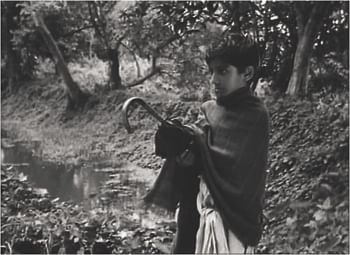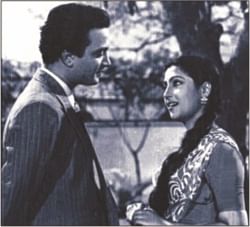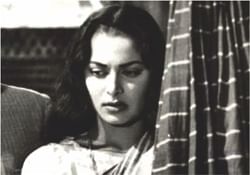| Home - Back Issues - The Team - Contact Us |
 |
| Volume 10 |Issue 35 | September 16, 2011 | |
|
|
In Retrospect Nostalgia Syed Maqsud Jamil
Tomorrow and tomorrow and tomorrow creeps in the petty pace to the last syllable of recorded time'. Yet our fondness for the past is a fact of life. Time flows on. A child born comes out of mother's lap, becomes a toddler, then learns to walk and goes to school, the child blooms in youth, as years come and go the youth greys, middle age sets in, which many call as the age of wisdom. The demarcation line is murky; perhaps nostalgia sets in here with a sense of dispossession associated with the loss of older members of the family. Nostalgia finds the past endowed with everlasting appeal and having memorable qualities. Naturally, the past was not always without its share of woes and miseries, yet our hearts seek and celebrate the pleasures, the times and the memories of the past. The old is always gold. Nostalgia has such inexplicable character. There was a time that folks would love to talk of winsome Kanan Bala, the cine Prima Donna with golden voice, the unforgettable thespian Pramathesh Barua and the legendary singing actor K.L. Saigol. They would rise to the heavens in describing the ageless appeal of 'Mukti' and 'Devdas'. They would wax into a trance in remembering the golden voice of Kanan Devi and how many times they had gone to the Kolkata theatres to see her movies. Who can forget Jaganmoy Mitra's Chithi (Letter). They would not accept anything that would not establish Pramathesh Barua 'the Prince' as the unbeatable best. He was followed by K L Saigol in the Hindi Devdas, the thespian Dilip Kumar was Devdas in Bimol Roy's film. Dilip has already established himself as a drunken sot par excellence in his portrayal as Shankar in 'Dag'. He was in his elemental best as Devdas. The latest pendas is Shahrukh Khan the Bollywood Badshah. The old timers' choice was Pramathesh. Such was the demand for 'Babul Mora Naihal Chutal Jai( Oh! My father ...) and 'Jab Dil Hi Tut Gaya' (When the heart is broken) famed Saigol, that Mukesh with his nasal voice was found as his replacement. In his early years he sang 'Dil Jalta Hai to Jalne De (If the heart burns let it burn).
The post-47 generation found Lata Mangeshkar, Mohammad Rafi, Talat Mahmud, Hemanta Mukherjee, Manna Dey and Sandhya Mukherjee et al as the voice to sing of love, courtship, their trials and tragedy. The new generation of idols consisted of Dilip Kumar, Raj Kapoor, Dev Anand, Uttam Kumar, Soumitra Chatterjee, Nargis, Madhubala, Meena Kumari, Waheeda Rehman and indeed Suchitra Sen! Excepting Dilip, Dev Anand, Soumitra, Suchitra Sen and Waheeda Rehman the rest are long gone. Dilip, Dev Anand, Suchitra and Soumitra are in advanced age. Waheeda Rehman a youngish star of the mid-fifties occasionally appears as the mother of the hero. The generation in their sixties and seventies, given a choice would always return to these golden voices and would embark on a celestial voyage of stardom to describe the epochal eminence of these stars. Nostalgia has such great hold. The legend of Lata Mangeshkar stands in her own right. A teenager, she came to limelight with her voice in an all time classic song 'Aayega Aanewala' (The one who is to come will come) of Mahal. That was 1947. Perhaps for the fist time a playback singer's name was there in the credits. The voice survived for over half a century, singing both Hindi and Bengali songs and in a number of other regional languages with exquisite melody. Her part of the song 'Tere liye' (For you) of the film Veer-Zara found phenomenal popularity, although when she sang it, she was possibly in her late seventies. The generation that was raised on her voice finds blissful repose in her songs. To them she is the nightingale of the east. She turned out Fabulous compositions for a number of maestros Naushad, Shankar-Jaikishan, Hemanta Kumar or Mukherjee, S D Burman, Salil Chowdhury, Madan Mohan and R D Burman. Her list of great songs is so large that a passing mention would not do justice to her prodigious talents and her countless followers. From Aayega anewala (Mahal) to Mujhe bhul gaye sawaria (Baiju Bawra), from Ye zindegi usiki hai jo kisika ho gaya (Anarkali) or Kahi Deep Jale Kahi Dil (Bees Saal Baad) to Tumhi meri mandir tumhi meri puja (Khandan), from Ar jeno nei kono bhabna (Deep jele jai) to Priotomo ki likhi tomae Lata takes you on a journey of everlasting melody.
Nostalgia has special meaning for Suchitra-Uttam movies for the iconic appeal of Suchitra Sen's quintessentially Bengali beauty in particular. Sen understands the importance of this nostalgia for her cine persona that is why she would not let her old age picture to come out in the media. Madam Sen's Bangladeshi followers have come forward to preserve her parental home in Pabna as a museum in her honour. The hearts of the generation that saw her movies would flutter to reminisce about her histrionic charms. How the euphoric feeling of love would envelop their hearts in other worldly trance, spellbound by her charming grace and tantalising looks. For some, first love would start like that. Ms Sen was not all beauty. Her character portrayals were of remarkably high level coming from a highly gifted artiste. Nostalgia however dwells on her romantic cine persona. From Sobar Upare to Sagorika, from Shilpi to Harano Sur her romantic appeal will endure with those who witnessed the time. But how gifted she was she proved it in Deep jele jai and Saat panke bandha with her outstanding performance. Madam Sen would be a class of her own in any country and in any age. Nostalgia for some is everlasting love with the voice of Hemanta, Rafi, Manna Dey, Talat Mahmud and Mukesh and with the movies of Dilip, Dev Anand and Uttam. Mannay Dey's 'Coffee Houser Addata' is an all time popular nostalgia song. Hemanta was the voice of a generation. He was an accomplished composer too, both in Bengali and Hindi. His lovelorn 'Muche jawa dingulo' and romantic humming of 'Ai rat tomar amar' puts nostalgia to waft to the days left behind. Rafi's Yade na jaye bite dinoke (Dil Ek Mandir) sings of nostalgia with such soulful outpouring of pathos. Rafi was a prolific singer. From 'Suhani rat dhal chuki' (Dillagi) to Bhagwan... (Baiju Bawra) Rafi's mastery put him on a pedestal. To Those who grew up in his time, Talat is regarded as gentlemen's singer. Indeed he had a mellifluous voice when he sang Tasbir teri dil mera bahela na sakegi or Aadho rate jodi ghum bhenge jai. Mukesh has a great following of his dewy voice that sang Tu kahe agar for Dilip in Andaz and Tara tute duniya dekhe in Malhar. Dilip, Dev Anand and Uttam were the idols of the time that many would get into a trance to describe. For the writer Pather Panchali, both the book and the Ray movie, De Sica's Bicycle Thief and Roman Holiday are the retreats that renew me. I found that nostalgia is a life long love affair.
Copyright
(R) thedailystar.net 2011 |


